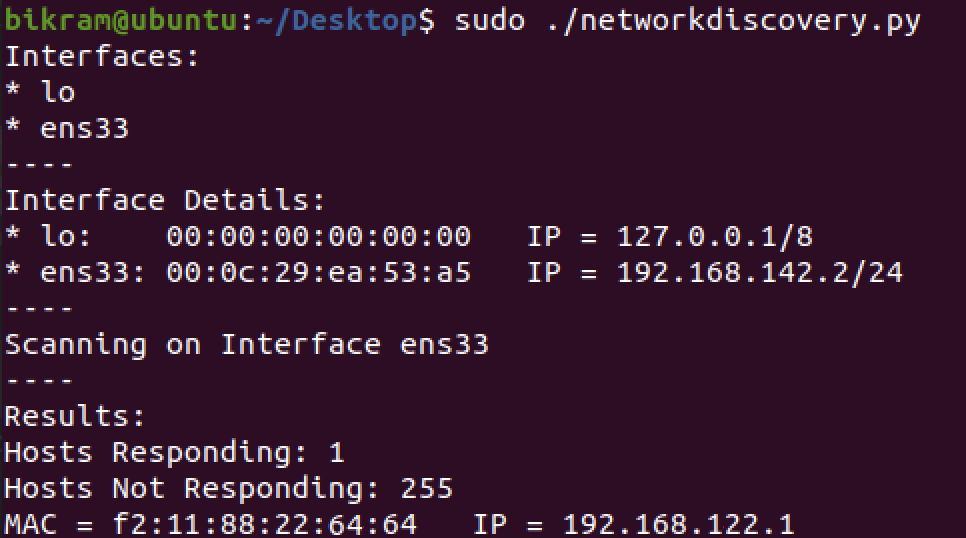Network Discovery | Traceroute | TCP and UDP Port Scanner

This program lists all available interfaces present in the local machine and uses Scapy to identify all online machines within the local machine's LAN that are accessible through each of the local machine’s non-virtual interfaces. To achieve this, this program creates an ethernet frame that encapsulates an ARP packet. The Ethernet frame has its destination address set to the broadcast address while the ARP packet has the localhost's subnet address along with the CIDR notation. Finally, Scapy creates a list of ARP packets that are broadcasted to every IP address in the subnet and prints the MAC and IP addresses of the online machines which send a reply back to the localhost.

This traceroute program accepts either the destination IP address or hostname from the user and identifies the IP addresses or possible hostnames of all intermediary machines in between the source and destination. First, this tool identifies if the user has entered an IP address or hostname and finds the respective hostname or IP address accordingly. Next, it creates an IP datagram encapsulating a UDP packet with random destination ports in the range of 33434 - 33464 along with random high number source ports. The IP destination address is either directly provided by the user or is obtained using the hostname provided by the user via Scapy. The max hop is set to 20 and the TTL increases in accordance with the current hop number so that all intermediary machines in the path with a distance less than or equal to 20 hops can be discovered. Finally, it sends and receives the packets from one hop to the next and reports the hostname and IP address present in the response packet. If a packet is not acknowledged within the expected timeout of 3 seconds, the packet is sent one more time. Otherwise, a '*' is printed. The program stops as soon as it receives an ICMP Port Unreachable message (type 3) from the target which signifies that the packet has reached the destination and the destination port is no longer open.

usage: ./networkdiscovery.py [-h] [--version]
Network Discovery
optional arguments:
-h, --help show this help message and exit
--version Show Program's Version Number and Exit
usage: ./traceroute.py [-h] [--version] [--target TARGET]
Traceroute
optional arguments:
-h, --help show this help message and exit
--version Show Program's Version Number and Exit
--target TARGET Hostname or IP
usage: ./portscanner.py [-h] [--version] [--target TARGET] [--port PORT] [--tcp | --udp] [--verbose]
Port Scanner
optional arguments:
-h, --help show this help message and exit
--version Show Program's Version Number and Exit
--target TARGET Hostname or IP to scan
--port PORT Port [X] or Port Range [X-Y] to scan
--tcp TCP port scan (mutually exclusive with --udp)
--udp UDP port scan (mutually exclusive with --tcp)
--verbose Verbose output (Print all ports, not just open ports)
Distributed under the MIT License.